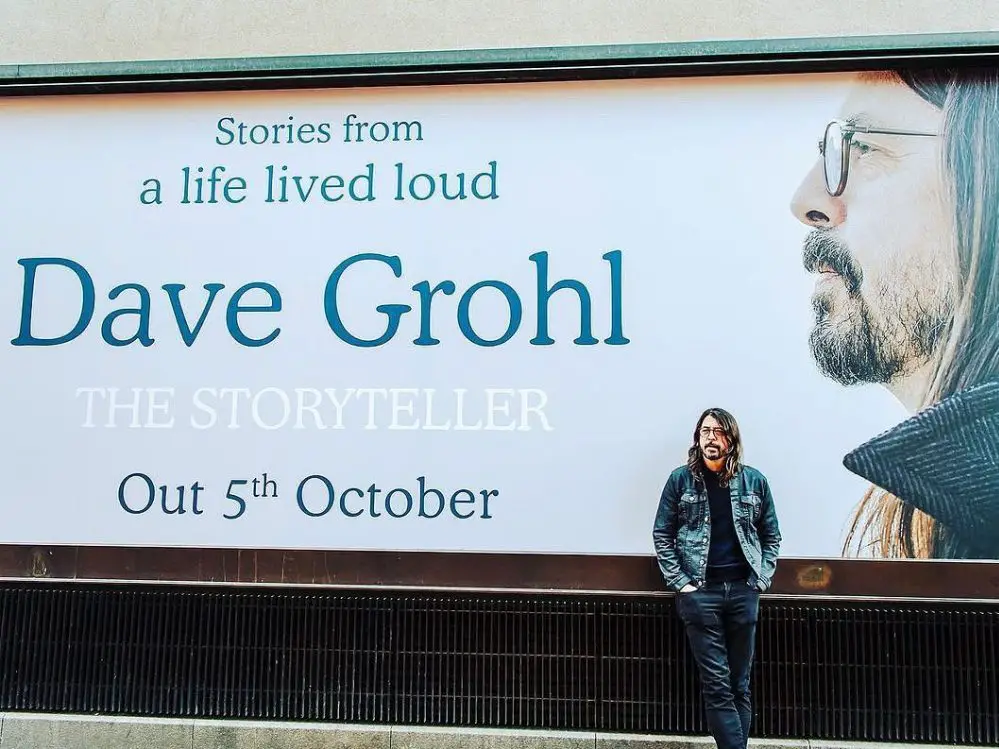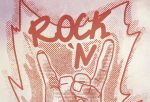What else could be more interesting than the underbelly of 20th-century rock ‘n’ roll? The sheer level of mystery behind the scenes is enough to spark my curiosity. And considering my undying admiration for Dave Grohl’s musical accomplishments and notoriety, I couldn’t have been more excited to read his new memoir, “The Storyteller.” I was slightly skeptical at first, since a rock star turned writer doesn’t sound like a recipe for success. Fortunately, my apprehension couldn’t have been more misplaced. I impulsively assumed it would be another story about humble beginnings followed by fame and fortune, which in a way, it was, but Grohl’s tone and transparency was game-changing. It has the same feel as Anthony Bourdain’s memoir “Kitchen Confidential,” but with a lot less cocaine.
The Review of “The Storyteller”
For starters, the book’s design is creatively awesome. The inside of the cover has dozens of quotes scrawled all over, written in the classically messy handwriting of a musician. Reading through them, it honestly seems like a mess of references to different parts of his life, but it is cool regardless. The design also adds a sense of authenticity to the book and, right off the bat, gives Grohl’s memoir a reflective tone. He also includes tons of black-and-white photos throughout the book, drawing from his childhood, teenage and even adult years. My personal favorite was on page 70, which captures Grohl in a sweater, slacks, black sneakers and a sneer that would make Ozzy Osbourne shake in his boots.
Something I loved about the book is how it reduced a musical legend down to your average Joe. All the stories about childhood bike accidents, career pressure and his rampant personal insecurities made Grohl so personable. It made me forget for a few seconds that I’m reading the words of an established musical and human prodigy, which I find to be a rare and special skill to have as a writer. His intentions with the book seem pure: Grohl didn’t want to provide bulls— lectures or rake in some cash; he wanted to connect with his audience through a far-too-relatable life journey. Such authenticity transforms “The Storyteller” into a nostalgic, inspiring and reflective masterpiece rather than a tale of some hot-shot slipping toward another career path.
To me, the most captivating parts of “The Storyteller” came from the descriptions of live shows. For example, the raging adrenaline he captured at his band Nirvana’s concerts was equal parts electric and terrifying. One show Nirvana played in Dallas had the crowd “spilling over the floor monitors.” This was no regular group of fans, however; Grohl uses the phrase “mob of six hundred alcohol fueled adrenaline junkies” with “psychotic, raw energy” to describe the chaotic scene.
During the same show, Kurt Cobain, in boiling rage, smashed his guitar on stage. He decimated an engineer’s soundboard and even bloodied a security guard’s head with the shattered instrument (weapon?). The act of violence resulted in a wild-goose chase toward the emergency exit with the guard and his similarly enormous friends close on their tail. Such intimate and life-threatening details made my stomach tingle with excitement. The sheer exhilaration from each live show was incredible and Grohl did an excellent job at bringing his experience to life. In my opinion, the skillful imagery makes it clear that the storied musician is a good writer.
As for criticisms, I wish that “The Storyteller” included more commentary on the music industry, both today and during his youthful years (I say that with no disrespect to Grohl’s middle age). The memoir seemed to carefully tiptoe around a mountain of opinions about the industry. For example, he quipped about a contract that resulted in a lawsuit, but never followed up on the ostensibly large event. His tone seemed critical here, but the language never delved too far into the subject. It may have been some kind of subtle diss, but given his reputation in the music world, Grohl would be heavily supported by his fans, friends and family. I understand not wanting to wander into the crossfire, but even simple 2-cents commentary about the highly alluring music business would be of high value to readers.
On a different note (pun intended), Grohl is incredible at capturing his emotions in words. As I mentioned, he maintains a level of transparency that separates the book from other written projects. He describes the traumatic loss of fellow bandmates, his childhood best friend, Kurt Cobain, his father and more. Loss led Grohl to “buil[d] his walls higher,” locking away the regret and pain that came with loss. He found himself yearning for the “feelings he desperately needed to feel” but couldn’t because of “those f—ing walls [he] had built so high.” It’s tragic, but also profoundly relatable. This section of “The Storyteller,” despite being depressing, was incredibly eye-opening. It was a gentle reminder of the illusory invulnerability the general public assigns to celebrities, something that can be detrimental to one’s understanding of success.
The Average Grohl
Throughout the memoir, Grohl writes himself as a curious, out-of-place and determined kid. At a very young age, he discovered his love for music, smacking pillows with meaty marching band drumsticks like his life depended on it. He references tons of smaller bands, unfamiliar to my musical library, that he drew inspiration from as a teenager. But just like any other musician, Grohl had his fantasies and idols. Whether it was gazing upon late-great jazz drummer Lenny Robinson, drooling over John Bonham’s drumming for Led Zeppelin or playing a show with Iggy Pop himself, Grohl’s teenage aspirations seemed too regular and relatable for someone of his status.
“The Storyteller” frequently reminds me of the faces behind the instruments by letting everybody temporarily play the main character. His older cousin Tracey was his introduction to punk music, the gateway toward his rock ‘n’ roll career. His best friend, Jimmy Swanson, was his musical partner-in-crime. His mom was always his biggest supporter, no matter what. My exotic assumptions of Grohl’s life were reduced to unrealistic fantasies.
His life on paper seemed so normal, and I find that to be incredible. Obviously, he experienced more stadium shows and Oscar performances than I ever will, but that’s beside the point. In short, the book never loses sight of the reality and audience it works to connect to. In fact, it adds an entirely new dimension to my previous understanding of fame.
Quirky Rockstars
A common theme throughout the memoir is letting your freak flag fly, as Grohl puts it. He uses the phrase multiple times, helping describe how his wallflower identity actually aided his journey toward stardom. As a kid and even today, he claims to have never found himself “fitting in” exactly. Even as he toured with his first major band, Scream, Grohl was kicking it in old tour vans, dive bars and baggy band T-shirts. Even the studios he recorded at were never of the highest caliber; in fact, most of his best work was recorded in cheap studios with minimal time and money. All of these seemingly weird foundations of success clear more of the readers’ personal assumptions about being a celebrity. His momentous career was founded on simple hard work, passion and, granted, a few strokes of luck. Nonetheless, it’s deeply inspiring as a reader to watch his success sprout from such humble beginnings.
What’s even more inspiring is the career Grohl has carefully constructed over the past 30 years. Despite his self-proclaimed “life lived loud,” he managed to come out on the other side entirely more successful than his massive breakout as a member of Nirvana (after reading Grohl’s dangerous and nail-biting stories, that’s far more impressive than it sounds). The musician now has a family of three daughters and his wife, Jordyn Blum. He has his second family, the world-renowned band Foo Fighters. Now, he has a No. 1 New York Times bestseller. With quite the beefy resume under his belt, who knows what Grohl will do next? Whatever it is, I await with eager excitement. As long as it’s anything like “The Storyteller,” I have a feeling my expectations will be rendered moot.
















